-
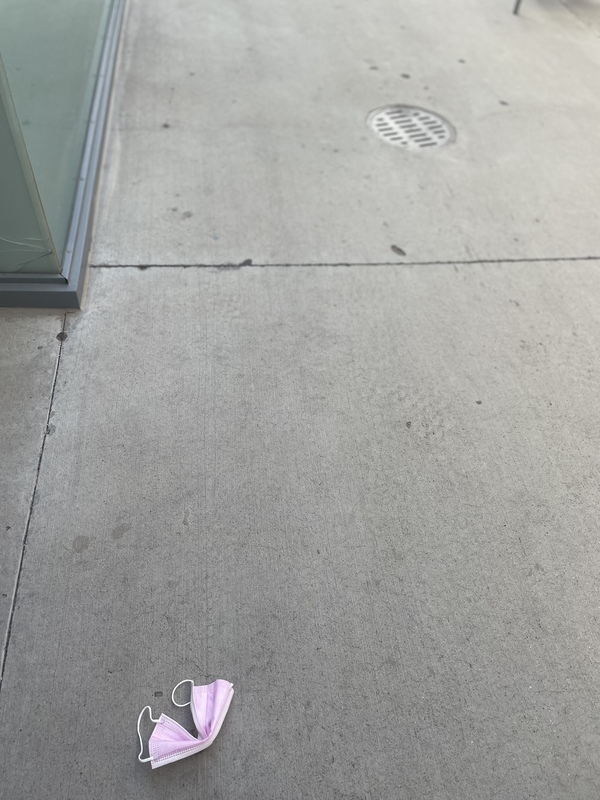
2022-02-08
A pink disposable mask on ASU’s campus near Coor.
-
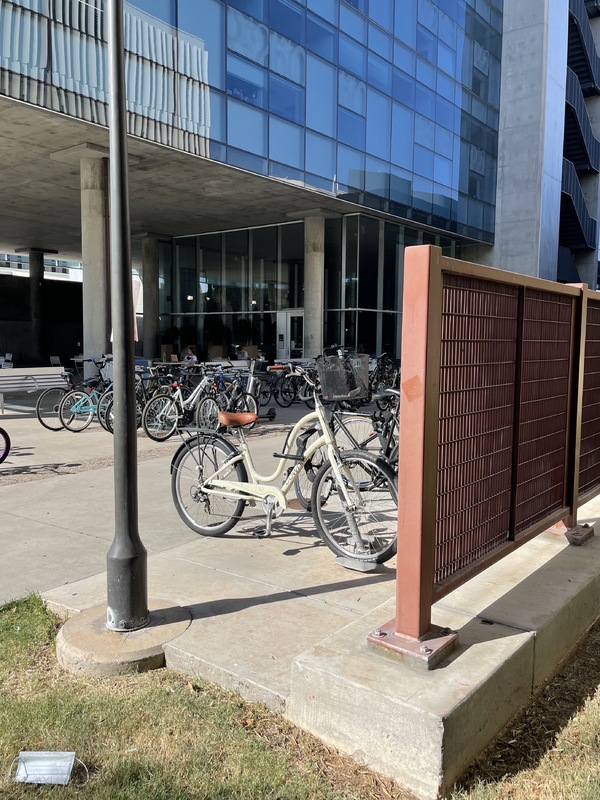
2021-09-22
A disposable mask was discarded/lost by the bike rack near the COOR building on campus.
-
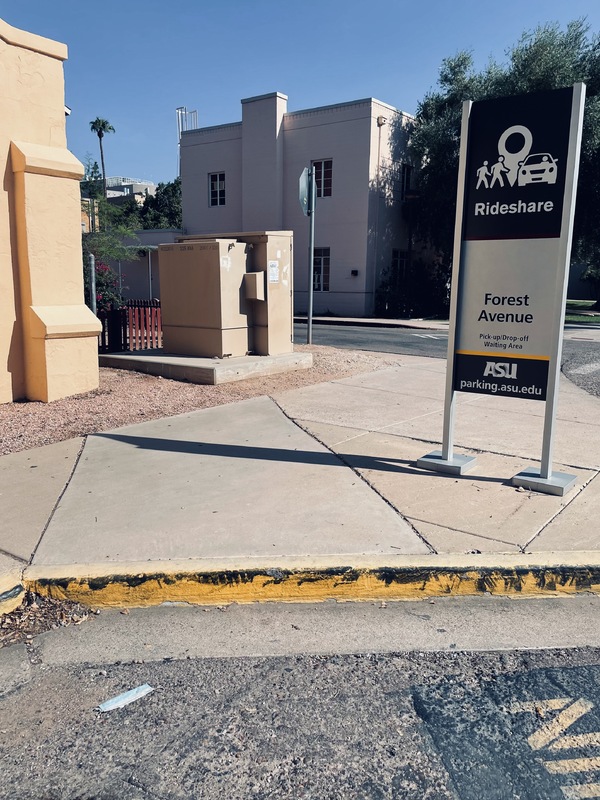
2021-09-03
Mask trash near the pick up-drop off at Forest Ave on ASU's campus.
-
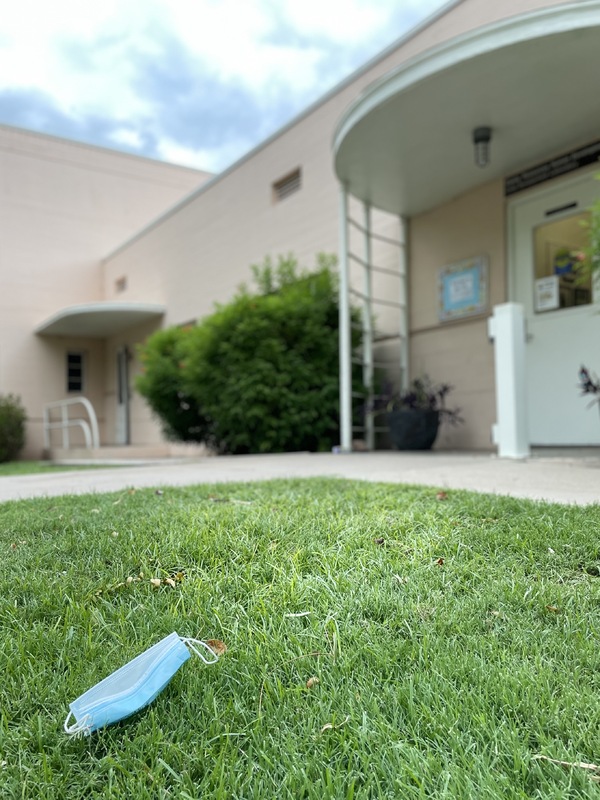
2021-08-21
Wednesday, August 18 was the eve of the first day of classes at Arizona State University. It was also the first week that the Child Development Lab (CDL) was open for daycare on campus. I picked my son up around 5:00 PM and took this picture of mask trash, likely unintentionally dropped by one of the parents outside the center.
This image is part of the mask trash series.
-
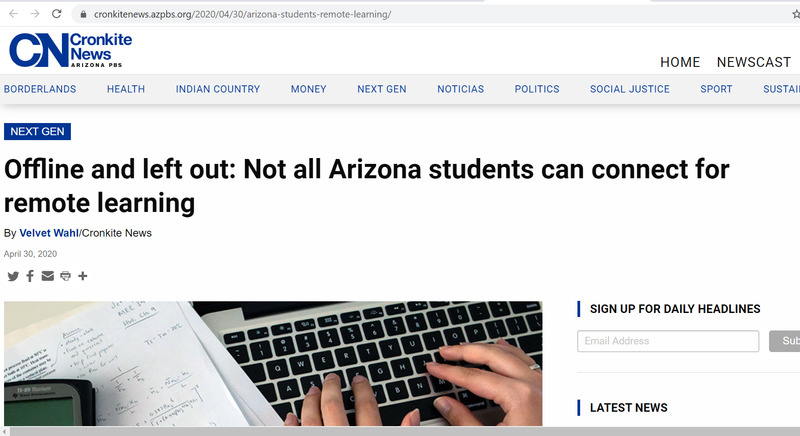
2020-04-30
This article focuses specifically on Arizona's efforts to provide students with internet/technology access in order to achieve online learning. It goes into detail about how several Phoenix schools dealt with the pandemic and online learning in the spring semester of 2020 as well as discusses how some students dealt with internet access issues in creative ways, either due to lack of internet or hotspot issues. Some examples are utilizing hotspots or through just going to public areas despite quarantine conditions to complete schoolwork.
-
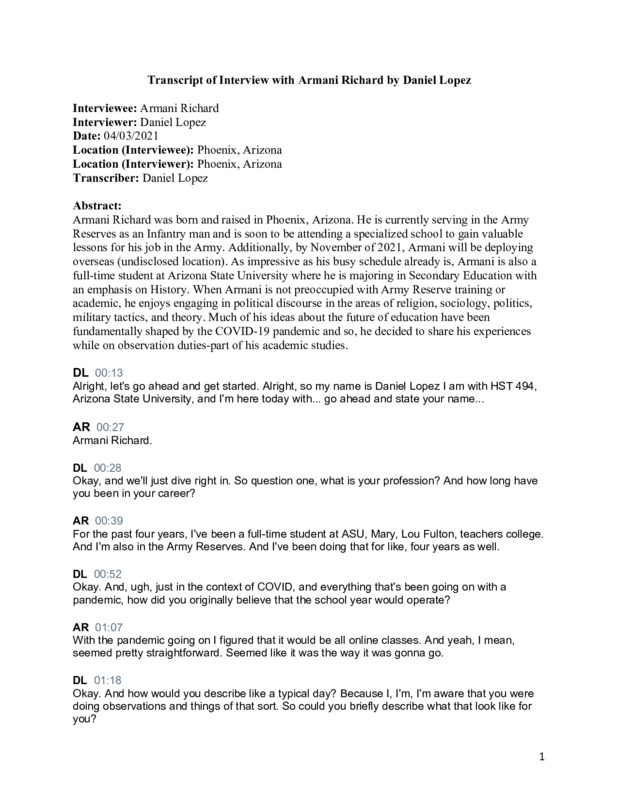
2021-04-03
Conversation with Armani Richard and the impact of COVID-19 on Arizona education. Currently studying at Mary Lou Fulton Teachers College and fulfilling a promising career in the Army.
-
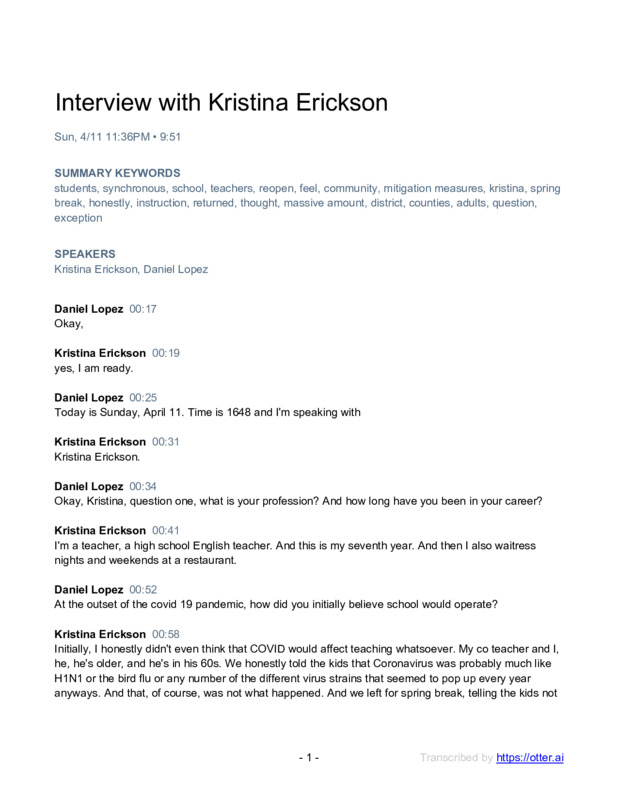
2021-04-11
Conversation with Kristina Erickson an Arizona K-12 educator. Ms. Erickson weigh-ins on the March 15th executive order, in-person instruction, COVID protocols and procedures, and the future of education in her community
-
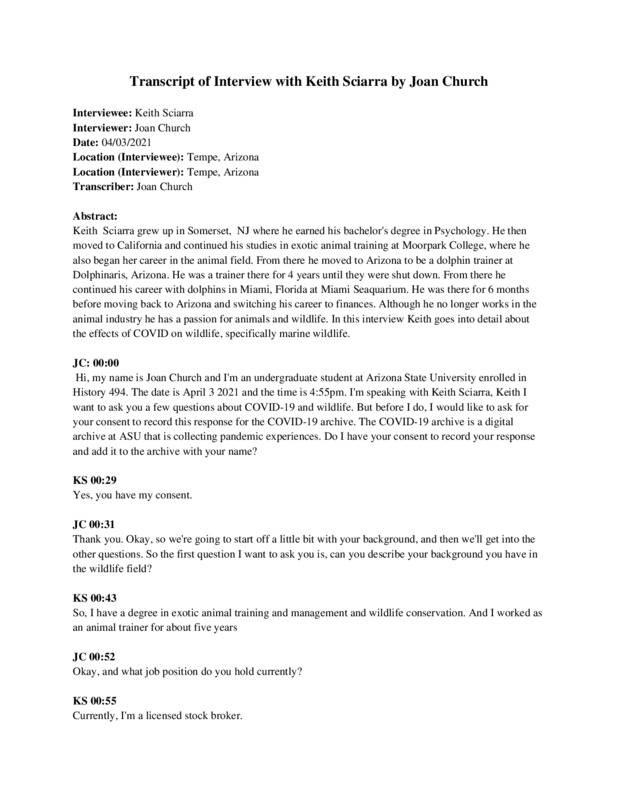
2021-04-03
This is an oral history interview with Joan Church and Keith Sciarra. Keith gives his insight on how covid-19 has affected wildlife. Keith has many years working within wildlife, specifically with dolphins and ocean life. He gives us advice on how we can help the cause after covid and talks on the topic of ocean conservation.
-
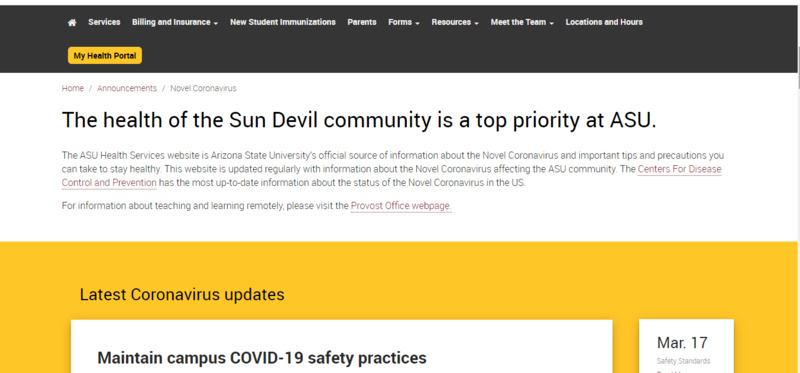
2021
This is the Arizona State University-specific COVID-19 resources for students. I wanted to include this University's specific resources because one of the people I interviewed attends ASU as a student and I want to provide this source as a supplement for some of the difficulty that he mentioned having in finding resources while living as a person experiencing housing instability. The website houses all messages and updates the university has sent to students with regard to the Coronavirus. The site focuses on health and staying healthy for students but seems to lack a clear guide on how to access resources and aid that students may qualify for.
-
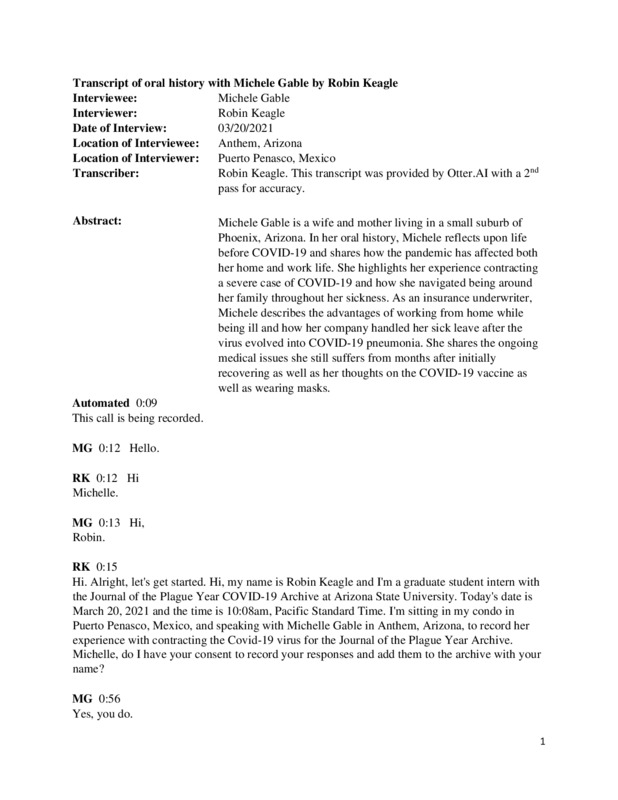
2021-03-20
Michele Gable is a wife and mother living in a small suburb of Phoenix, Arizona. In her oral history, Michele reflects upon life before COVID-19 and shares how the pandemic has affected both her home and work life. She highlights her experience contracting a severe case of COVID-19 and how she navigated being around her family throughout her sickness. As an insurance underwriter, Michele describes the advantages of working from home while being ill and how her company handled her sick leave after the virus evolved into COVID-19 pneumonia. She shares the ongoing medical issues she still suffers from months after initially recovering as well as her thoughts on the COVID-19 vaccine as well as wearing masks.
-
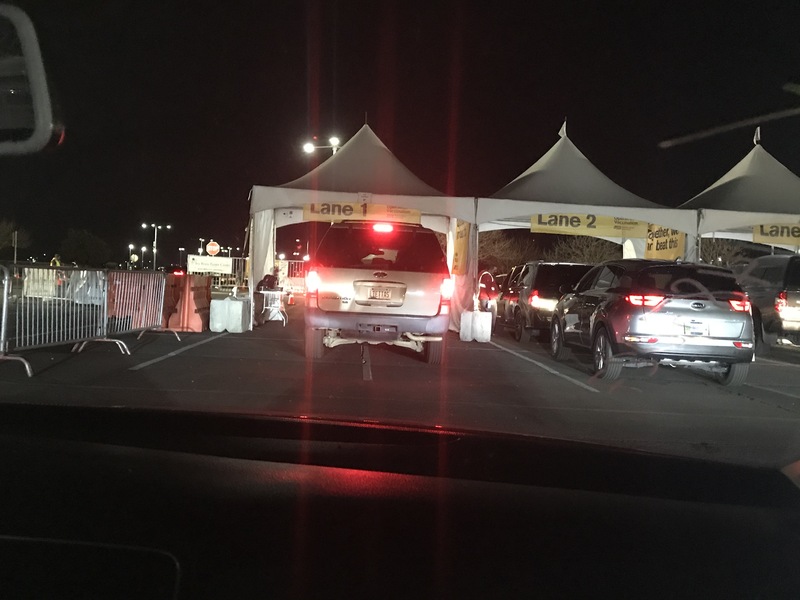
2021-03-16
I'd been trying to get a COVID vaccination appointment on the State of Arizona's website since late January. Finally, on the evening of Monday, March 15, I found a couple of slots open on the following evening at the State mass vaccination site at the Arizona Cardinals Stadium. It was about a 35-mile trip, and my wife drove me out there. Once we got to the site, everything went really smoothly and the staff were very pleasant. I got my first Pfizer dose and an appointment for April 6 for the second. It was nice to see the ASU banner at the site. Altogether, the travel time and the process on site took about an hour and forty-five minutes. I feel immensely relieved.
-
2020-03-28
During the 2019-2020, I was living at Vista Del Sol, the apartment style housing available to upper division Barrett students at Arizona State University. I was fortunate to share my apartment with three close friends, and over the course of the school year, we had often gotten together with some of our other friends to hang out and enjoy the college lifestyle in our apartment. After we all returned from spring break, we discussed how uncertain our futures would be with the pandemic, and with so little information or precedent available to us, we all faced uncertain circumstances. Three of us were from Tucson, but our fourth roommate was an out of state student, but we all wanted to remain in our room until the conclusion of the semester (when we were sure the whole situation would be over). However, with added stress from our parents, we found out over the course of a week, that all of our parents expected us to return home, where they presumed we'd be safer and better monitored, instead of leaving us to our own devices. Packing and spending those moments together were heartbreaking, and would only be amplified in the coming months as we were unable to see each other and spend time together, even for special occasions such as birthdays or other events. As a last hurrah, the weekend before our first roommate moved out, we threw ourselves a little goodbye party, with a roommates photoshoot that we reference even now, a year later.
-
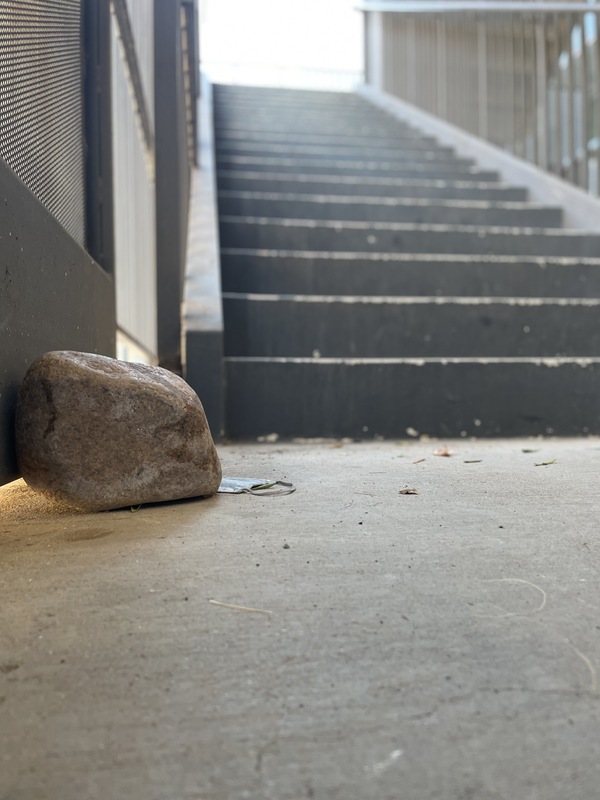
2021-03-06
It's rare to see trash or even discarded masks on campus. The university does a good job of keeping the grounds tidy and clean-looking. I found this mask near the back stairs of the COOR building.
-
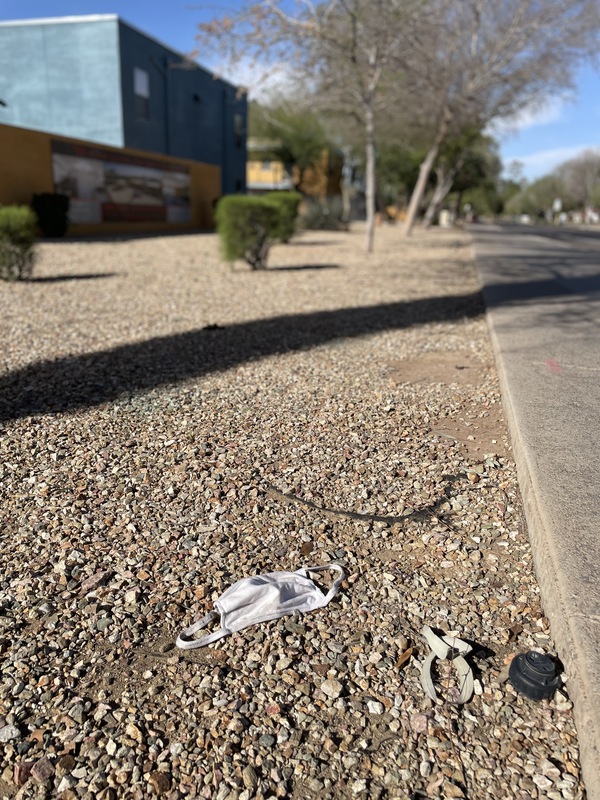
2021-03-06
I came across this white fabric mask while walking from home to the university. It was near the corner of Roosevelt and 5th.
-
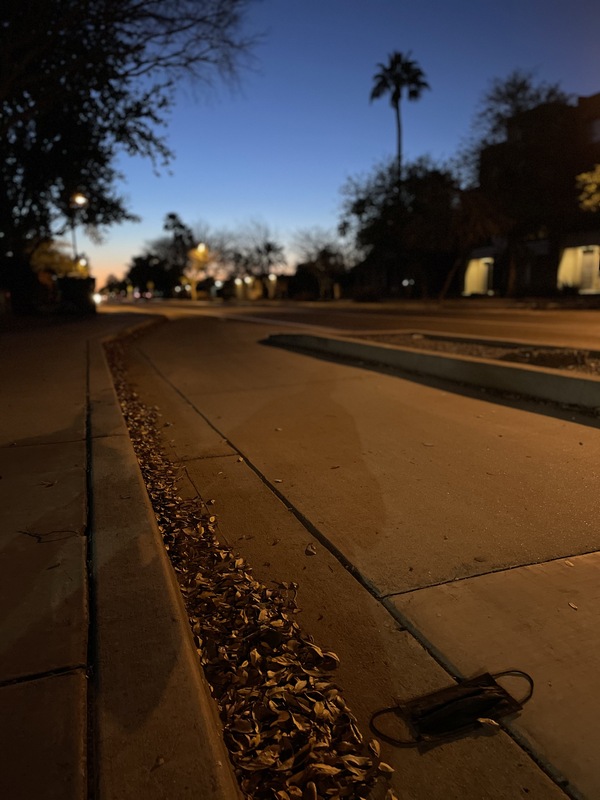
2021-03-04
Mask trash spotted on the walk back from Whole Foods near the intersection of 5th and Hardy.
-
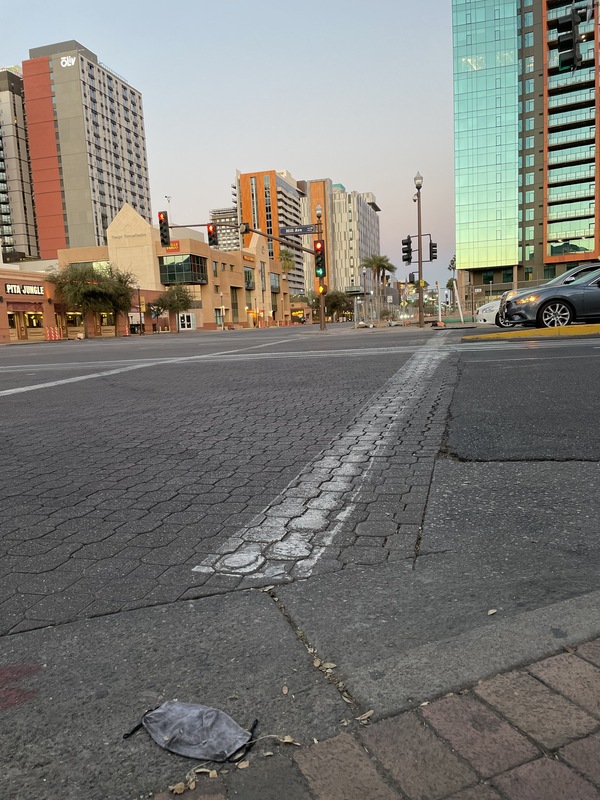
2021-03-04
Fabric mask spotted on the corner of Mill and University near Campus.
-
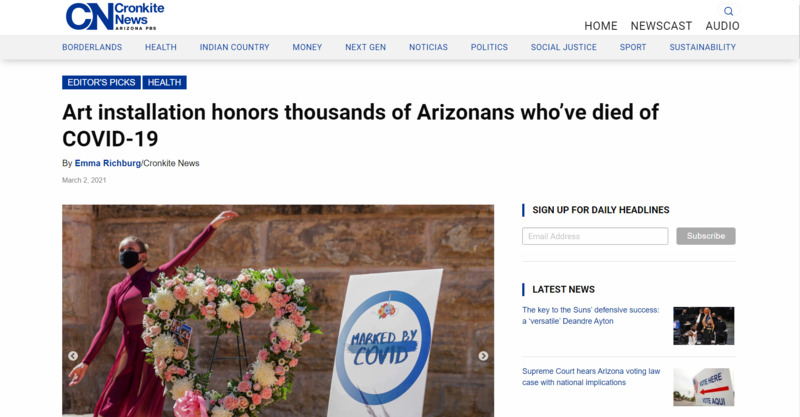
2021-03-02
Artist Kristina Libby and the Arizona nonprofit Marked by COVID teamed up to create a COVID-19 memorial. The memorial features a digital art piece showing flower petals falling from a rose. Each petal represents one person, and every two seconds represents one day. Libby also started the Floral Heart Project, another flower art project honoring COVID-19 victims.
-
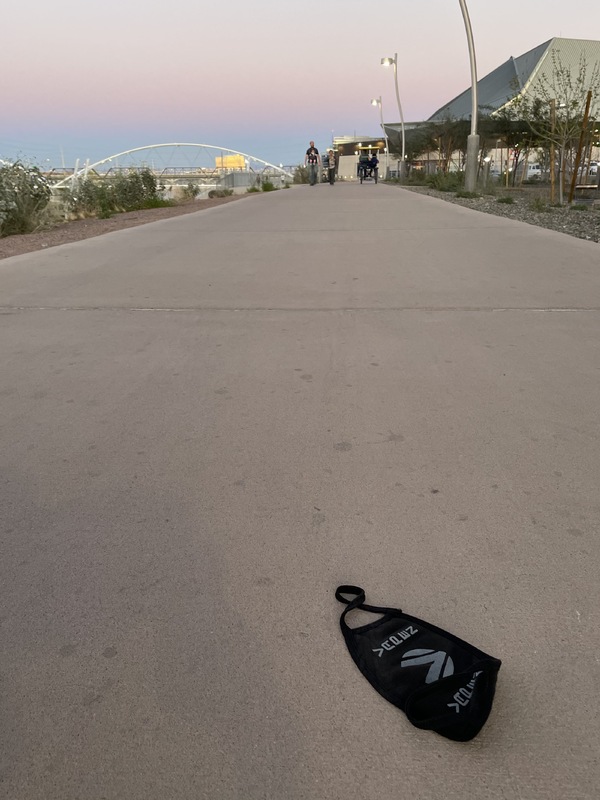
2020-03-01
Mondays are "no media Mondays," at our house. I went out with the family to the river walk along Rio Salado. On our way back to the car, I found this black, fabric, reusable mask on the path just down from the Tempe Center for the Arts.
-
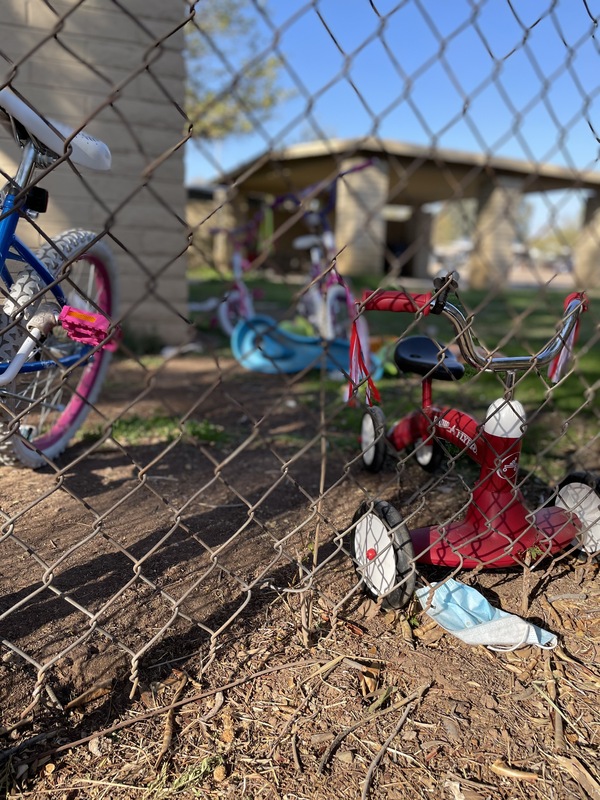
2020-02-27
Disposable masks are everywhere, I found this one stuck in my neighbor's fence.
-
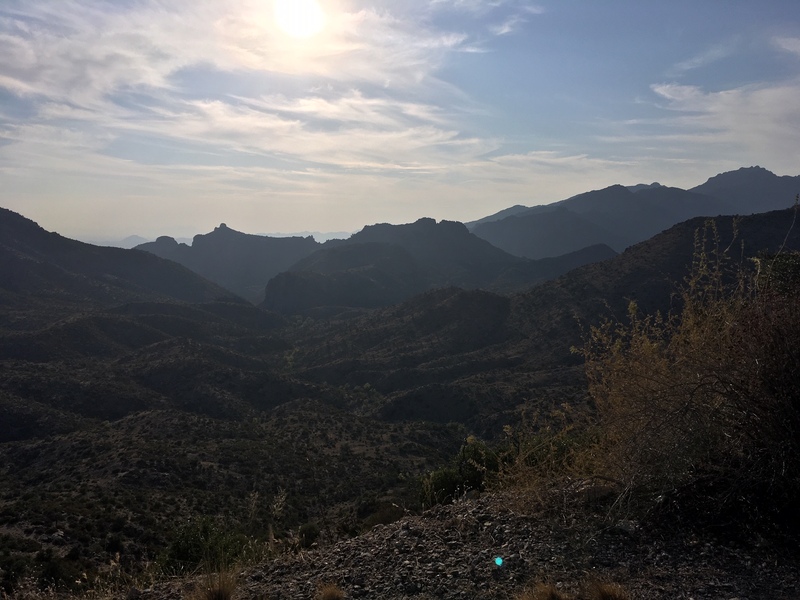
2021-02-16
This photograph of desert mountains in Tucson, Arizona, USA, shows the beauty and the power of nature. The image is associated with our creation of an Environment collection in the archive. We seek to collect stories about the environment: how it has been impacted by the pandemic, with changes in pollution levels, increased levels of trash, and alterations in human interactions, and how humans have interacted with the environment during the pandemic, using it decrease stress, get out of the house, grow food, and gain a greater knowledge and appreciation of it.
-
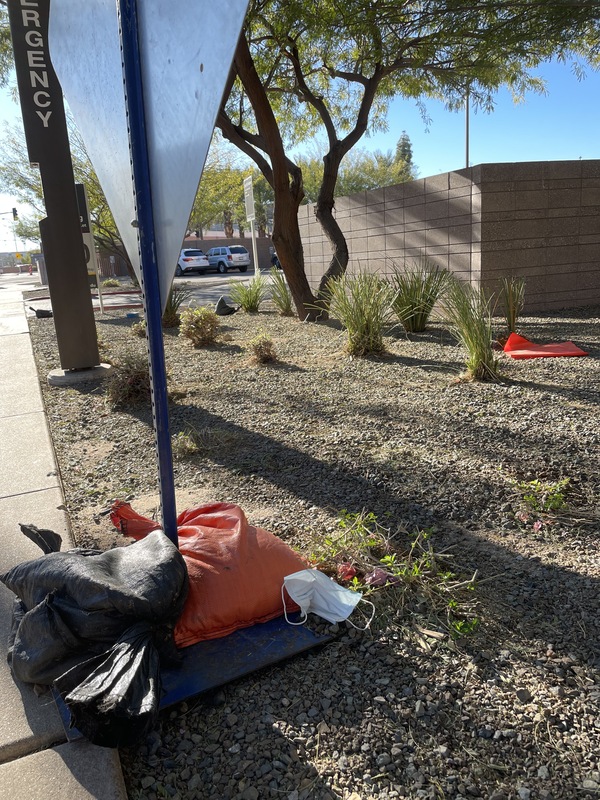
2021-02-22
Disposable mask spotted en route from the Tempe transit center to the Childhood Development (Psychology building) on Campus along Veteran's Way. 33°25'21.0"N 111°55'45.3"W
-
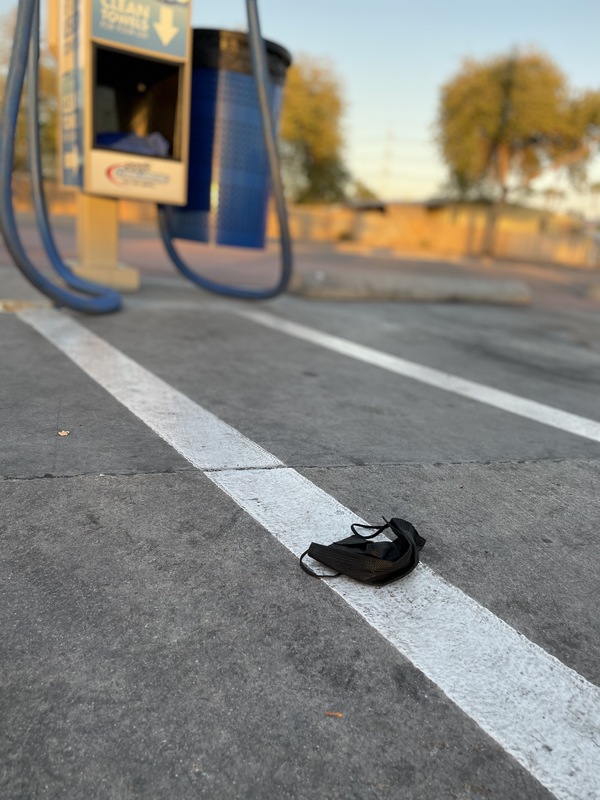
2021-02-20
I saw this black, disposable mask while vacuuming my van on Saturday at Cobblestone Auto Spa. I picked it up and threw it away before it blew into the water channel.
-
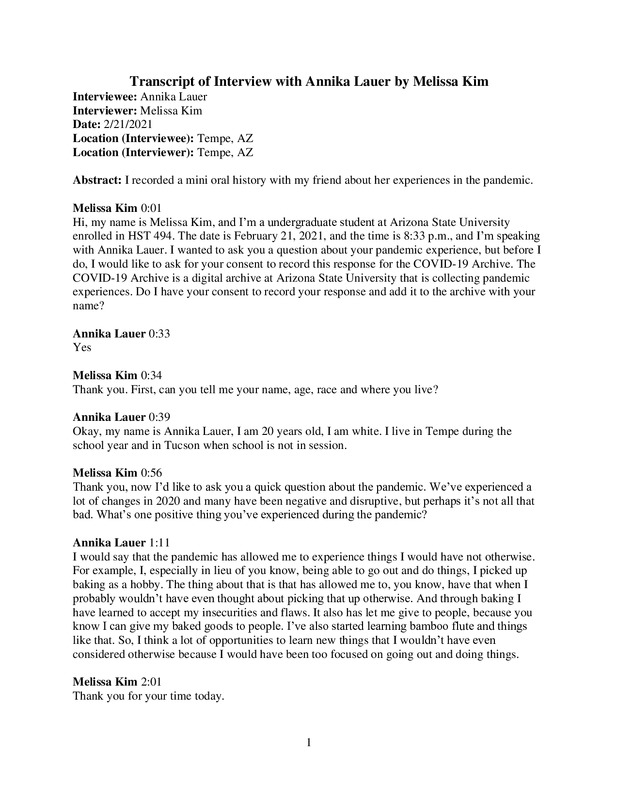
02/21/2021
I recorded a mini oral history with my friend about her pandemic experiences
-
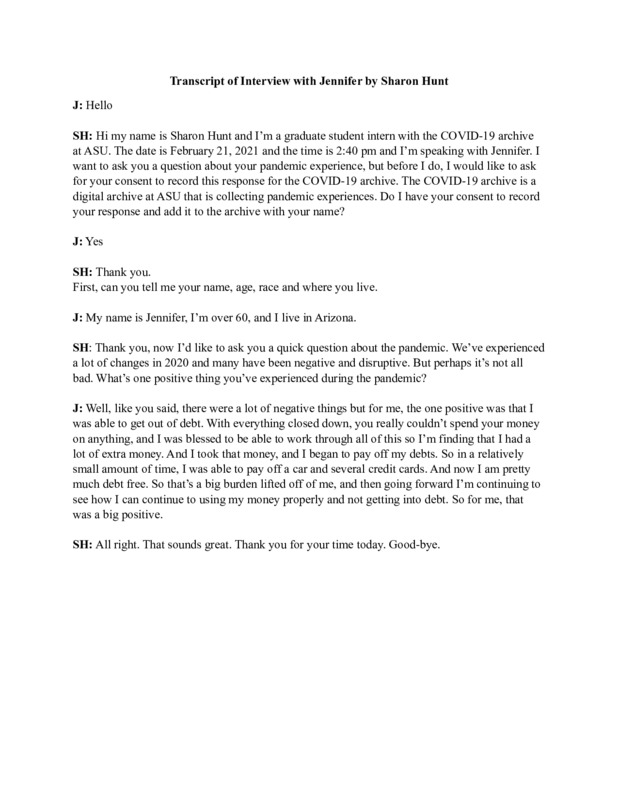
2021-02-21T14:40
Transcript of Interview with Jennifer by Sharon Hunt
Interviewee: Jennifer
Interviewer: Sharon Hunt
Date: 2/21/21
Location (Interviewee): Tucson, Arizona
Location (Interviewer): Tucson, Arizona
Transcriber: Sharon Hunt
Abstract:
Jennifer lives in Tucson, Arizona, and spoke about a positive result of the pandemic that she has experienced. She has been able to save money and pay off debts during this time period, as she has not been able to go out and shop or go to restaurants as she did in pre-pandemic times.
-
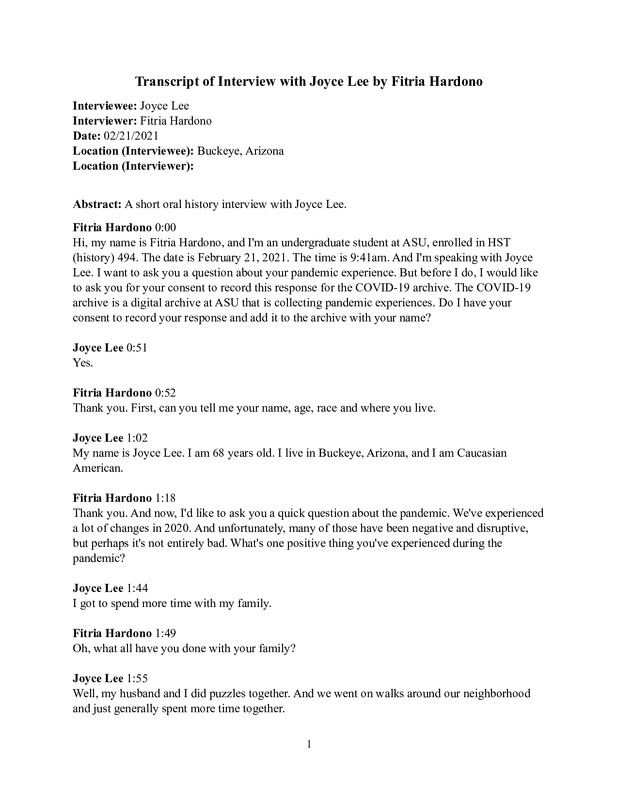
02/21/2021
Mini Oral history interview with Joyce Lee
-
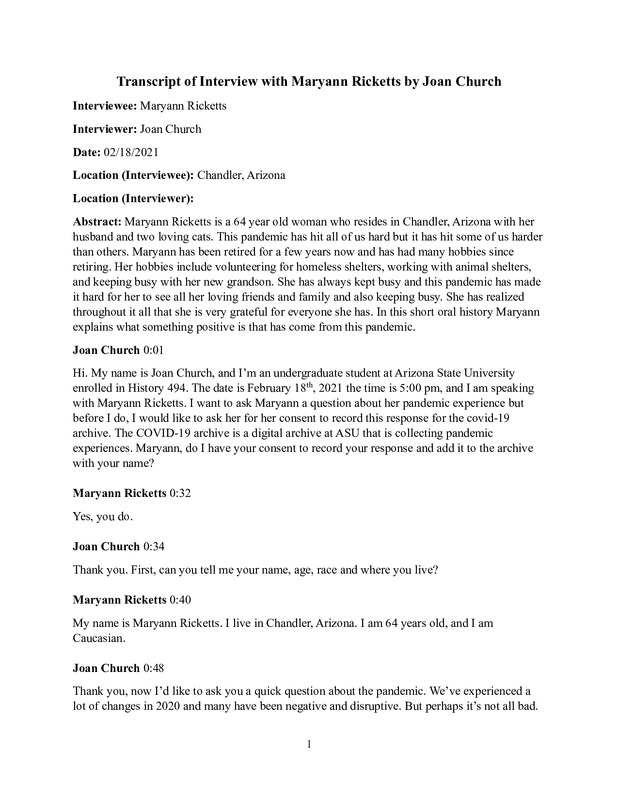
02/18/2021
Maryann Ricketts is a 64 year old woman who resides in Chandler, Arizona with her husband and two loving cats. This pandemic has hit all of us hard but it has hit some of us harder than others. Maryann has been retired for a few years now and has had many hobbies since retiring. Her hobbies include volunteering for homeless shelters, working with animal shelters, and keeping busy with her new grandson. She has always kept busy and this pandemic has made it hard for her to see all her loving friends and family and also keeping busy. She has realized throughout it all that she is very grateful for everyone she has. In this short oral history Maryann explains what something positive is that has come from this pandemic.
-
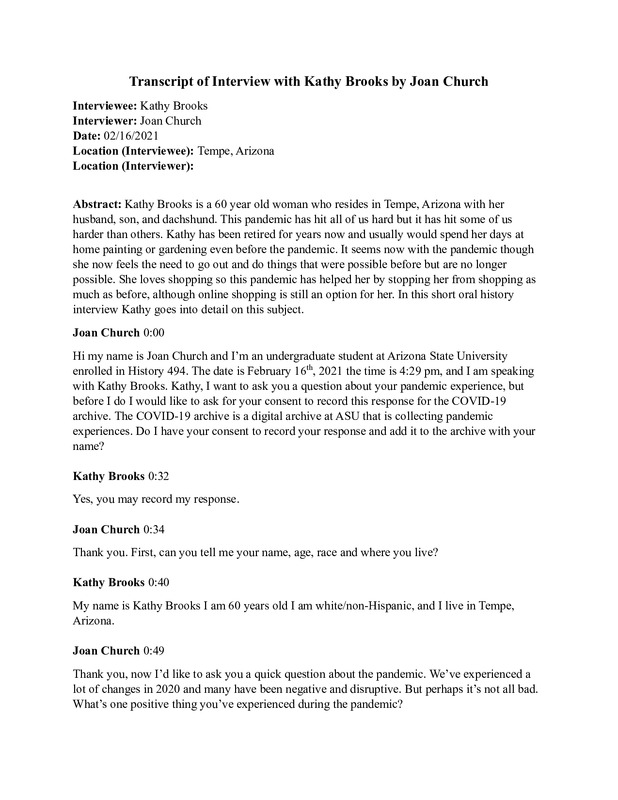
02/16/2021
Kathy Brooks is a 60 year old woman who resides in Tempe, Arizona with her husband, son, and dachshund. This pandemic has hit all of us hard but it has hit some of us harder than others. Kathy has been retired for years now and usually would spend her days at home painting or gardening even before the pandemic. It seems now with the pandemic though she now feels the need to go out and do things that were possible before but are no longer possible. She loves shopping so this pandemic has helped her by stopping her from shopping as much as before, although online shopping is still an option for her. In this short oral history interview Kathy goes into detail on this subject.
-
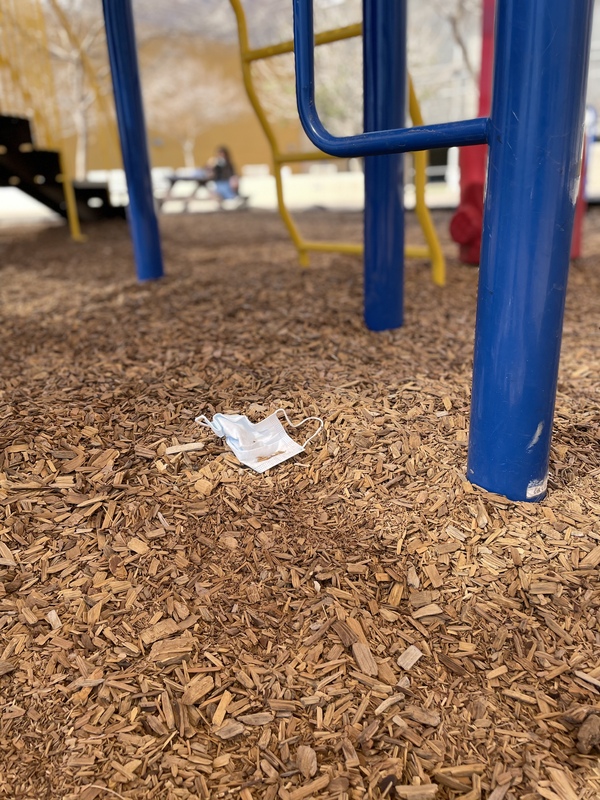
2021-02-20
Mask trash on the playground at the Kroc Center in Phoenix, AZ
-
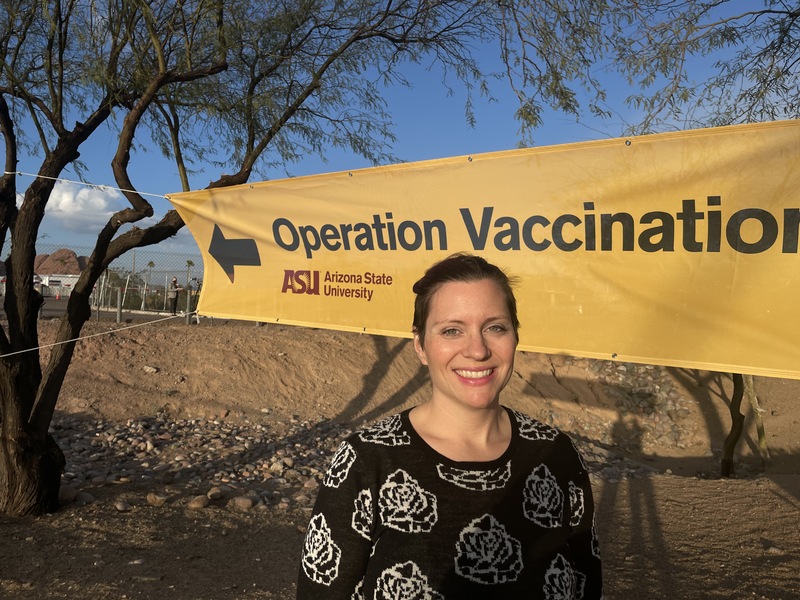
2021-02-19
ASU is now vaccinating people on campus. Members of the ASU community receive an email when they are eligible. I am eligible and have tried making an appointment twice, but the appointments are always full. After you get a vaccine, employees are supposed to upload a copy of their vacine to an ASU website.
-
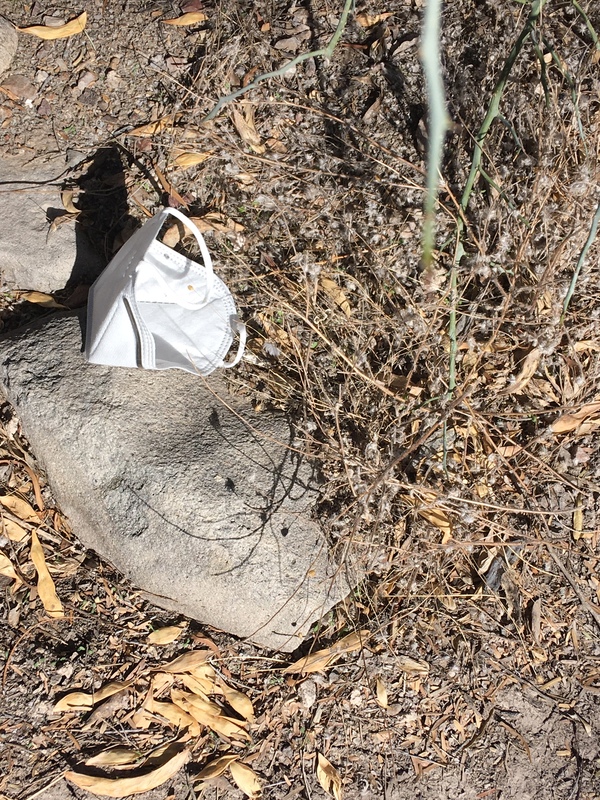
2021-02-07T18:36
This is a photograph of a mask discarded on the side of my yard, in the desert where many animals such as coyotes, quail, javelinas, and rabbits make their homes. I have seen much pandemic-related trash discarded on the sides of the road, on sidewalks, and in people’s yards during this pandemic: hand sanitizer bottles, masks, wipes, etc. With the pandemic has come an increase in the use of disposable materials such as these, adding to environmental degradation and displaying a disregard both for people and for animals. This photo of mask trash shows a toxic side effect of the pandemic and a reminder that people need to use non-disposable items whenever possible and show respect for our natural environment by not throwing things away in this manner.
-
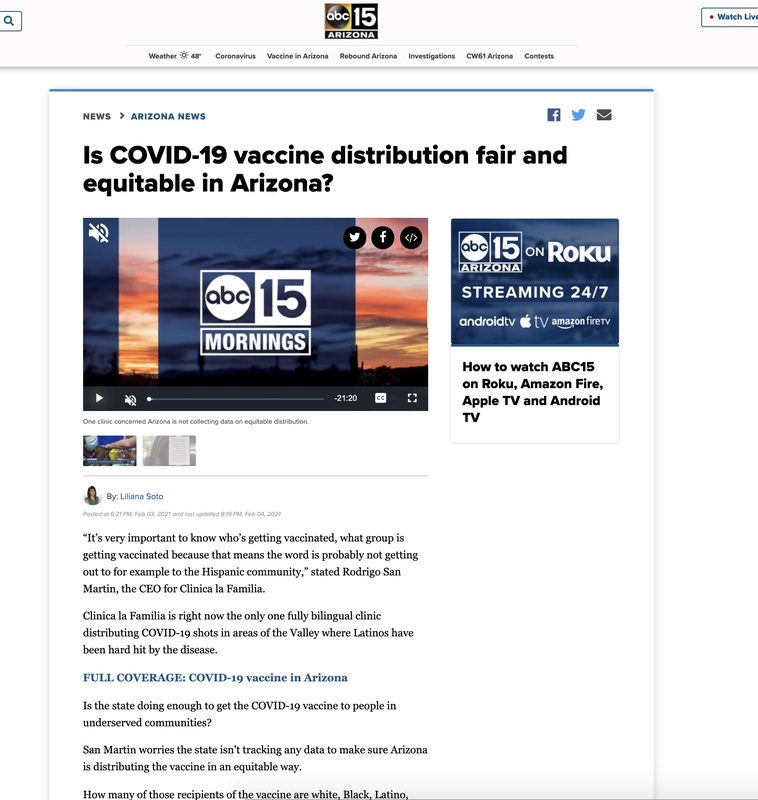
2021-02-03
Minorities have been hard hit by COVID-19 and some want to ensure that they are receiving the vaccine. However, some states, like Arizona, are not providing that information. It is unclear whether the demographics data isn't being collected or if the information just isn't being released to the public.
-
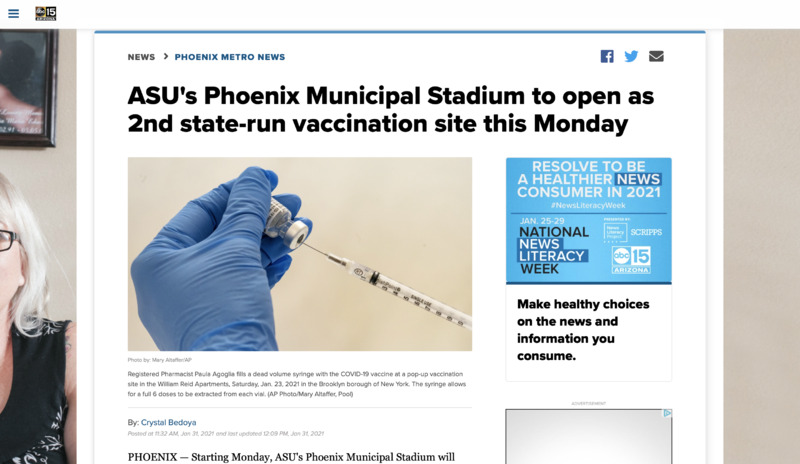
2021-01-31
Already more than a month into Arizona's vaccination program, the state has just announced its second vaccination site for the Phoenix area, one of the largest metro areas in the US. The rollout has been slow, with only a little more than half of one million people having received the vaccine as of 30 January, 2021.
-
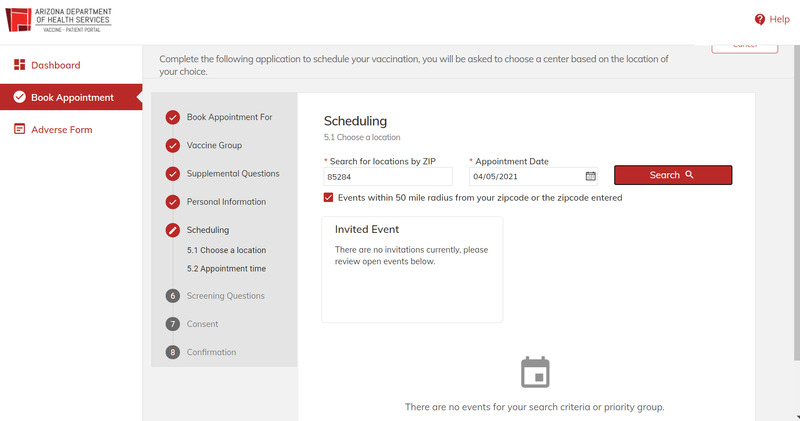
2021-02-28T10:55
This picture shows what I get when I try to schedule a COVID-19 vaccination through the Arizona Department of Health Services website. I'm basically out of luck for the time being. It is good that a vaccine is available now and the end of the pandemic is in sight, but the process is frustrating.
While I understand that our state agency had to develop their website in a short time, they've known for months that vaccines were on the way. Their site is needlessly complex, buggy, and non-informative. I initially got hung up on a page that required me to enter my health insurance information; it took several tries and a few phone calls to figure out exactly what I needed to enter in each of the fields.
Once I get through, I can't find an open appointment. There is no indication on the webpage, but it seems that the system returns no open appointments for me because I am not yet eligible. My mother who is more than 75 years old has managed to get an appointment and get her first shot.
I'm concerned that many other people, particularly the elderly who need the vaccination more than others, will not get access to them because they will not be able to navigate through the website. I have read a number of media reports about this. It seems like poor planning to set up a process that relies on individuals to use the internet without offering an alternative.
-
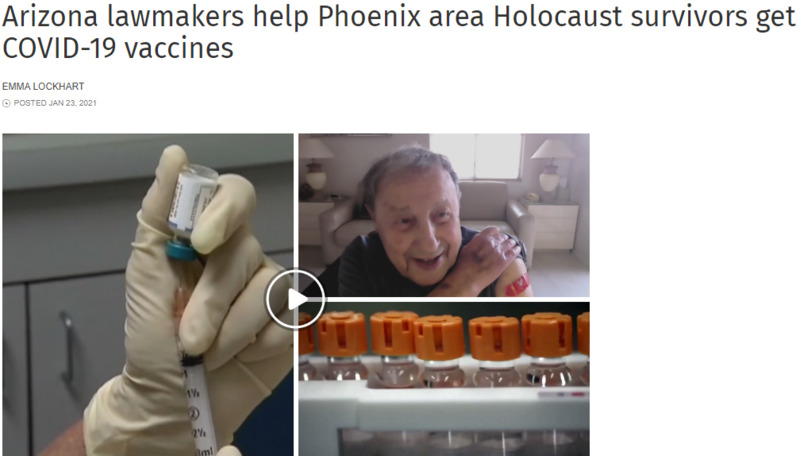
2021-01-24
97-year-old Alexander White, a Holocaust survivor, got a vaccine with a push from Arizona lawmakers.
-
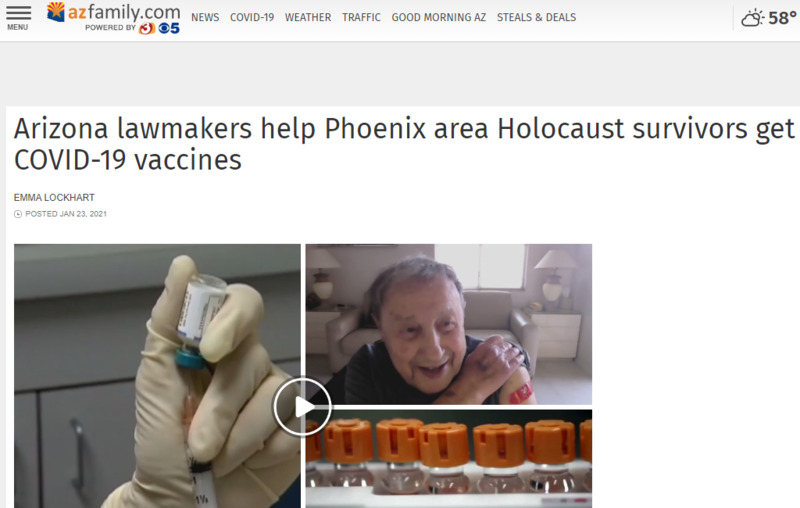
2021-01-24
97-year-old Alexander White, a Holocaust survivor, got a vaccine with a push from Arizona lawmakers.
-
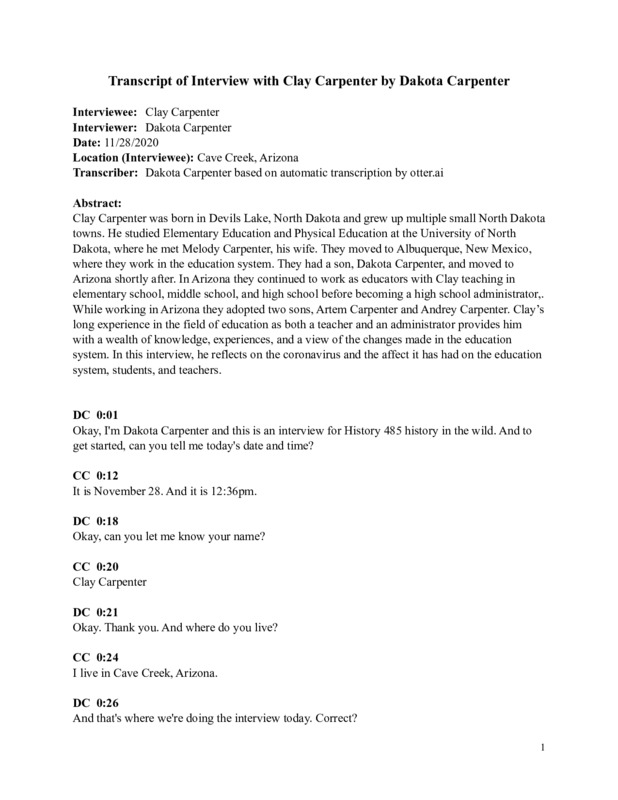
11/28/2020
This is an interview with Clay Carpenter. Clay Carpenter was born in Devils Lake, North Dakota and grew up multiple small North Dakota towns. He studied Elementary Education and Physical Education at the University of North Dakota, where he met Melody Carpenter, his wife. They moved to Albuquerque, New Mexico, where they work in the education system. They had a son, Dakota Carpenter, and moved to Arizona shortly after. In Arizona they continued to work as educators with Clay teaching in elementary school, middle school, and high school before becoming a high school administrator,. While working in Arizona they adopted two sons, Artem Carpenter and Andrey Carpenter. Clay’s long experience in the field of education as both a teacher and an administrator provides him with a wealth of knowledge, experiences, and a view of the changes made in the education system. In this interview, he reflects on the coronavirus and the affect it has had on the education system, students, and teachers.
-
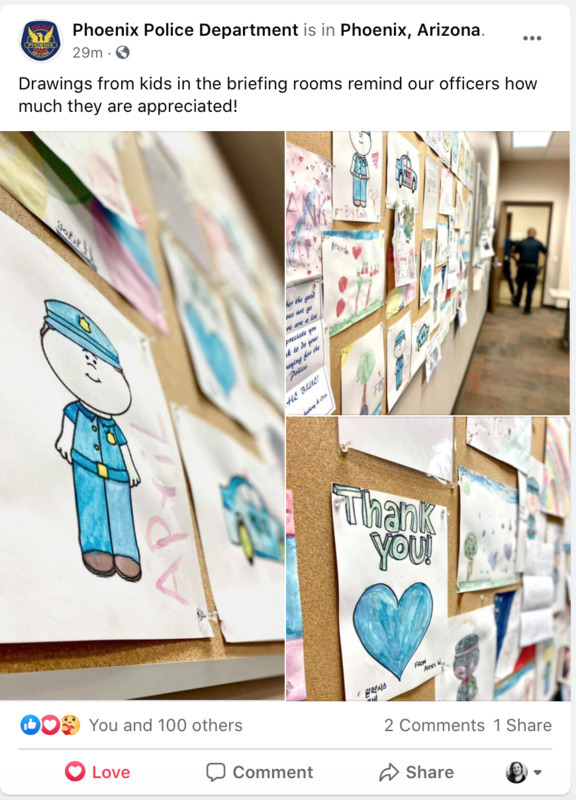
2020-11-22
Over the past 14 weeks, I have had the opportunity to work on The Journal of the Plague Year digital archive with Arizona State University. I learned a vast amount over the course of the internship, such as how to write press releases, collection plans, blog posts and other forms of advertising for the archive. I also learned about the ins and outs of archiving and the behind-the-scenes considerations that are involved in building and maintaining an archive.
This was my very first graduate school class and as such, I wasn’t sure that starting with an internship was the best idea, but after the first week or two I realized that this was the perfect way to start, since it was basically getting a preview of the type of work someone in the public history field would be doing and I got very excited, determined that this was the type of career I wanted to pursue.
The writing for publication skills that I have started to develop, I think will be extremely valuable as those skills are not just applicable to public history, but any career field really. The oral history project also provided the opportunity to work on my interviewing skills. Oral histories are vital to the study of history and even though this is an area I still need to work on, at least now I have the basic foundation to build on.
For my collection within the archive, I chose to focus on Law Enforcement, as that is a community that is near and dear to my heart. I currently work in law enforcement and I have family that does as well. When we discussed silences in our weekly readings, we talked about how to identify silences and how to work towards filling them. I noted that there were very few if any, submissions to the archive from the perspective of law enforcement so I wanted to work towards filling that silence.
Overall, this internship was a great experience and entry into both the public history field and graduate studies. I know that the skills I have developed here will serve me well as I continue my graduate studies!
-
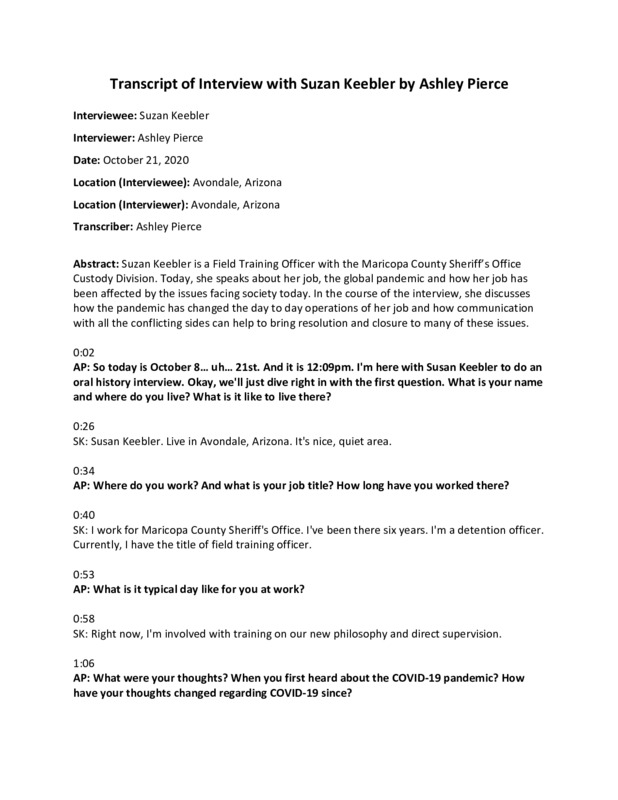
10/21/2020
Suzan Keebler is a Field Training Officer with the Maricopa County Sheriff’s Office
Custody Division. Today, she speaks about her job, the global pandemic and how her job has
been affected by the issues facing society today. In the course of the interview, she discusses
how the pandemic has changed the day to day operations of her job and how communication
with all the conflicting sides can help to bring resolution and closure to many of these issues.
-
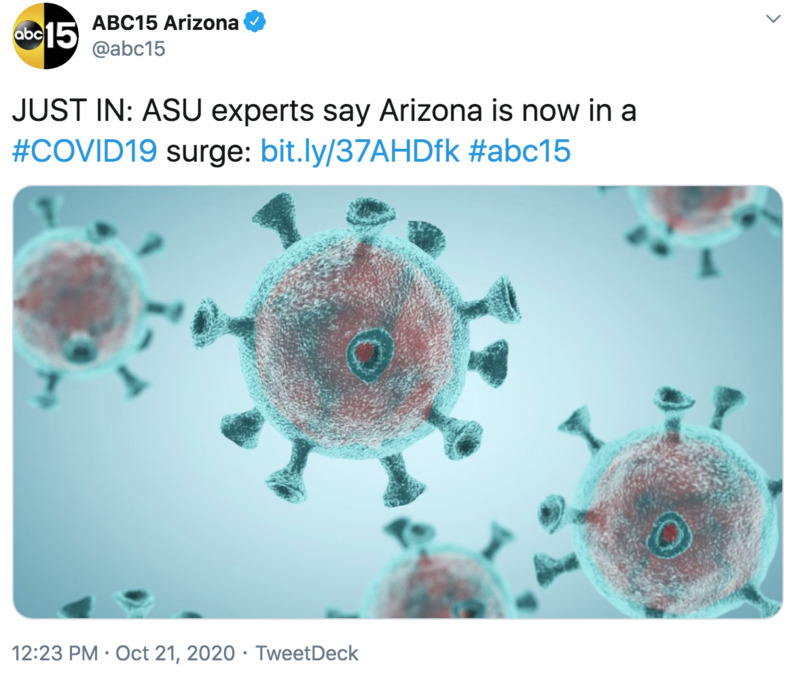
2020-10-21
Arizona is seeing a surge in its cases again as winter approaches. The state is nearing 1,000 new cases a day with hospitalizations and ventilator usage is increasing.
-
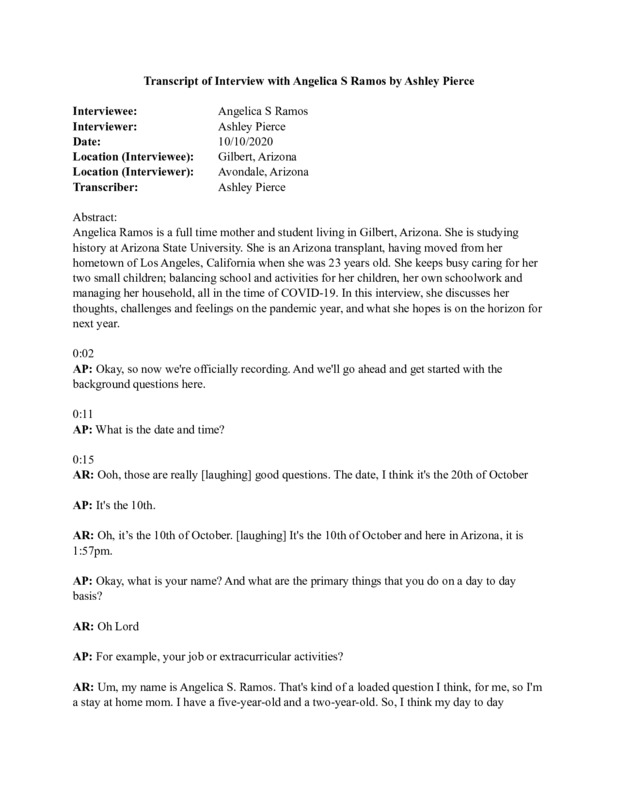
10/10/2020
Angelica Ramos is a full time mother and student living in Gilbert, Arizona. She is studying history at Arizona State University. She is an Arizona transplant, having moved from her hometown of Los Angeles, California when she was 23 years old. She keeps busy caring for her two small children; balancing school and activities for her children, her own schoolwork and managing her household, all in the time of COVID-19. In this interview, she discusses her thoughts, challenges and feelings on the pandemic year, and what she hopes is on the horizon for next year.
-
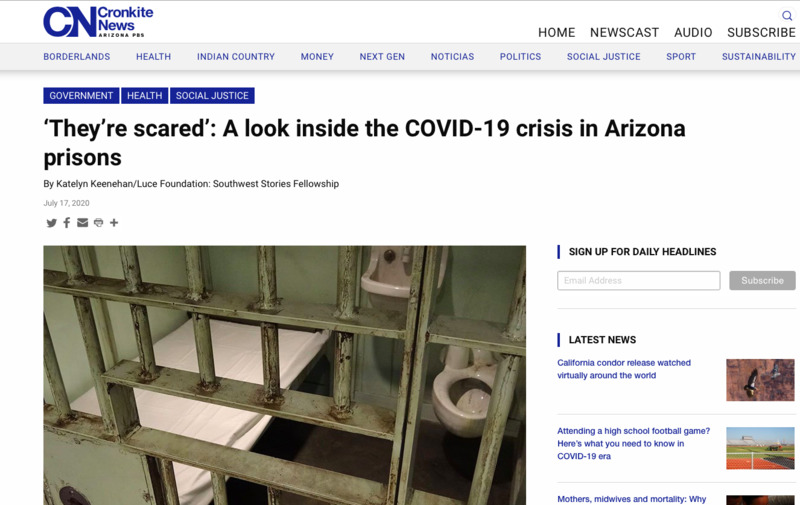
2020-07-17
As COVID-19 began to spread across the Southwest in March, lawyers representing incarcerated Arizonans reported “unsanitary conditions,” “inadequate medical staffing and treatment” and a “failure to take strong and sensible precautionary measures” in state prisons.
The combination left prisoners “highly vulnerable to outbreaks,” the attorneys wrote in a letter to the state before asking a federal judge to intervene. The judge did by issuing an order for officials to release more information, but prison advocates say it hasn’t been enough.
Nearly four months later, complaints of insufficient safety measures and subpar medical care continue to plague Arizona prisons. At least 569 prisoners at 13 of the state’s 16 prison complexes had tested positive for COVID-19 as of July 15, according to the Department of Corrections, Rehabilitation and Reentry, and at least 371 staffers have reported positive results.
Justice reform advocates and others with ties to the correctional system worry the state is running out of time to prevent an even more dangerous surge in cases. COVID-19 can spread swiftly in crowded indoor spaces and among individuals with chronic health problems.
-
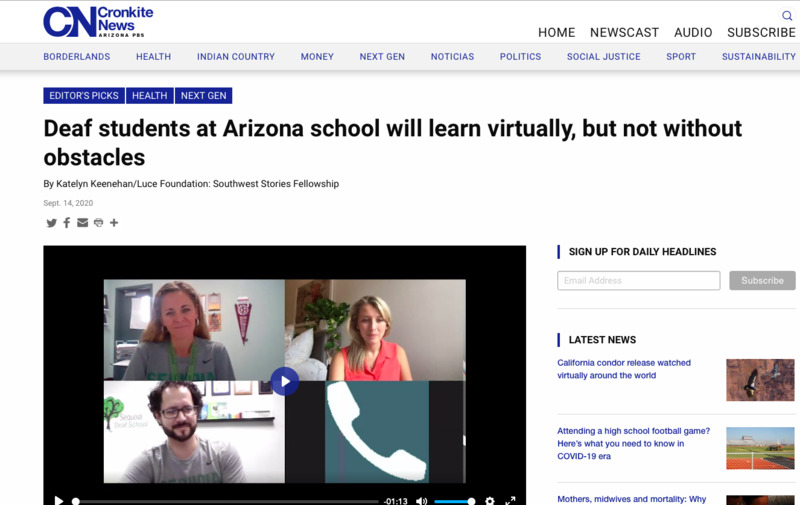
2020-09-14
Amid the COVID-19 pandemic, students are adjusting to their new normal when it comes to online classes, virtual events and social distancing to prevent the spread of the disease.
But for deaf and hard of hearing students in Arizona public schools, as well as for many more enrolled in private schools, these adjustments introduce new barriers to communication and learning. Last year, according to the Arizona Department of Education, 1,622 deaf or hard of hearing students were in public schools.
Sequoia Deaf School, part of the Edkey Inc. charter school group in Mesa, had 52 students enrolled in grades K through 12 for the 2020-21 school year. Its experience navigating the pandemic illustrates some of the challenges deaf students face, such as difficulty reading lips and faces behind masks, the shorter attention spans of young deaf students and the loss of their nurturing school community.
-
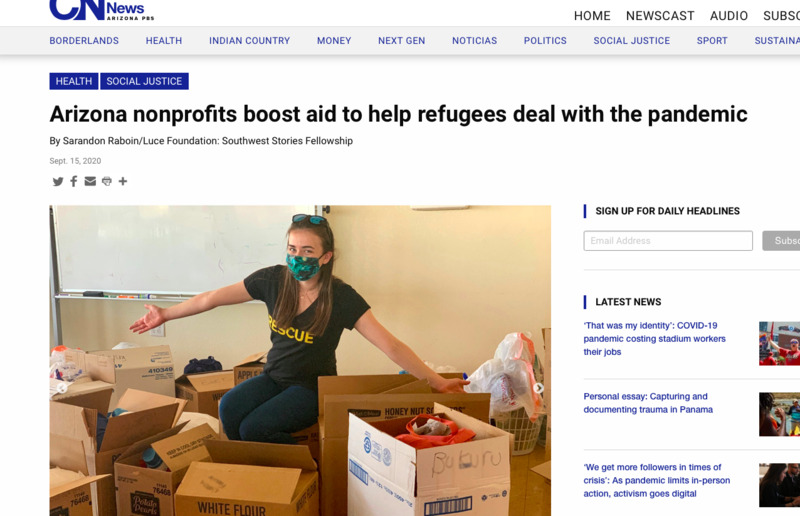
2020-09-15
By Sarandon Raboin/Luce Foundation: Southwest Stories Fellowship
-
2020-09-20
by Jessica Myers for the Luce Foundation: Southwest Stories Fellowship
-
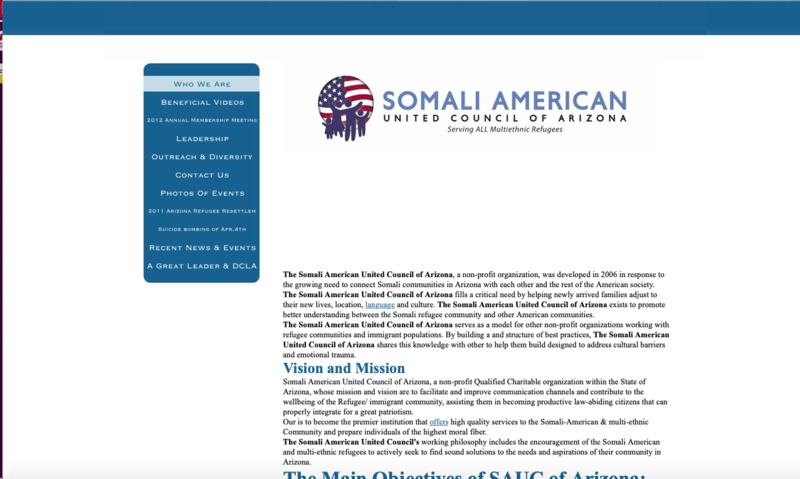
2020-09-16
The Somali American United Council of Arizona, a non-profit organization, was developed in 2006 in response to the growing need to connect Somali communities in Arizona with each other and the rest of the American society.
The Somali American United Council of Arizona fills a critical need by helping newly arrived families adjust to their new lives, location, language and culture. The Somali American United Council of Arizona exists to promote better understanding between the Somali refugee community and other American communities.
The Somali American United Council of Arizona serves as a model for other non-profit organizations working with refugee communities and immigrant populations. By building a and structure of best practices, The Somali American United Council of Arizona shares this knowledge with other to help them build designed to address cultural barriers and emotional trauma.
Vision and Mission
Somali American United Council of Arizona, a non-profit Qualified Charitable organization within the State of Arizona, whose mission and vision are to facilitate and improve communication channels and contribute to the wellbeing of the Refugee/ immigrant community, assisting them in becoming productive law-abiding citizens that can properly integrate for a great patriotism.
Our is to become the premier institution that offers high quality services to the Somali-American & multi-ethnic Community and prepare individuals of the highest moral fiber.
The Somali American United Council's working philosophy includes the encouragement of the Somali American and multi-ethnic refugees to actively seek to find sound solutions to the needs and aspirations of their community in Arizona.
-
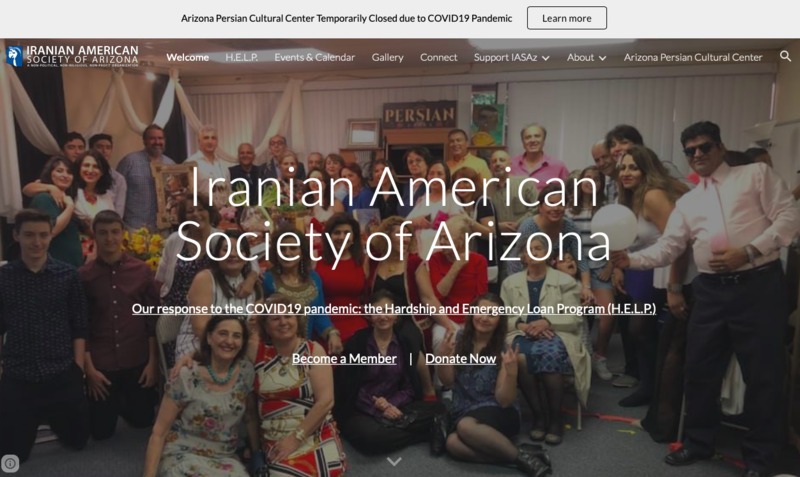
2020-09-14
At Iranian American Society of Arizona (IASAz), we strive to enrich the lives of Arizona residents by promoting an awareness of the Iranian culture, heritage, language, history and contributions through education, music, dance, theater, arts, food and sense of community. Our goal is to preserve, promote and encourage through education and charitable work, the richness of Iranian-American culture. We achieve this by organizing social, educational, recreational and other functions to promote better understanding and friendship both among the members of the organization and among individuals and organizations in Arizona who share an interest in Iranian culture.
-
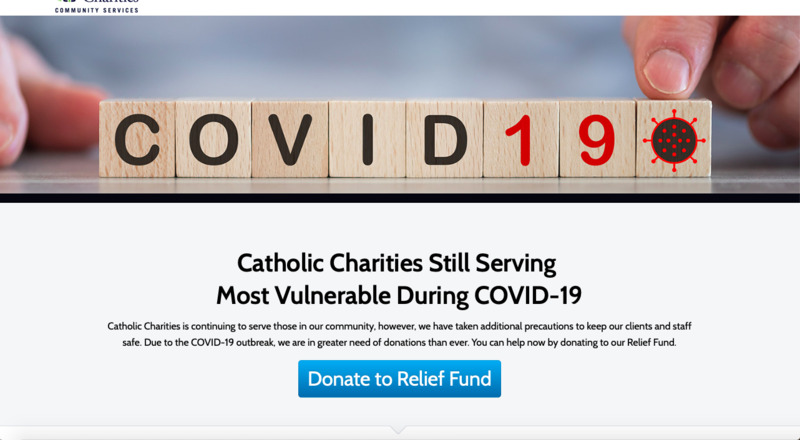
2020-09-08
Arizona has more than 62,000 refugees, who have been forced out of their country of origin due to persecution of race, religion, nationality, political opinion or membership to a particular social group. These are hard-working, often educated people who are struggling to survive. You can help them be welcomed into our country by helping provide for them as they start to settle. When you partner with Catholic Charities, you’ll help provide refugees with support in getting settled into American culture.
-
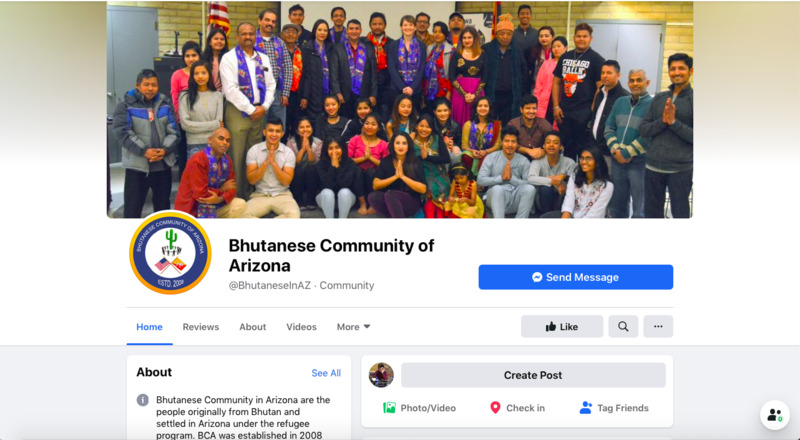
2020-09-08
Bhutanese Community in Arizona are the people originally from Bhutan and settled in Arizona under the refugee program. BCA was established in 2008
-
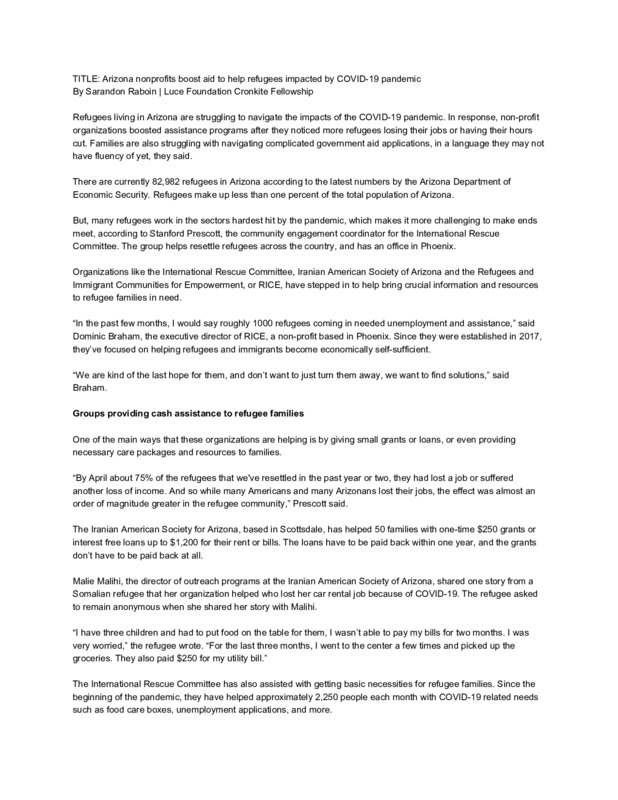
2020-08-26
By Sarandon Raboin/Luce Foundation: Southwest Stories Fellowship
-
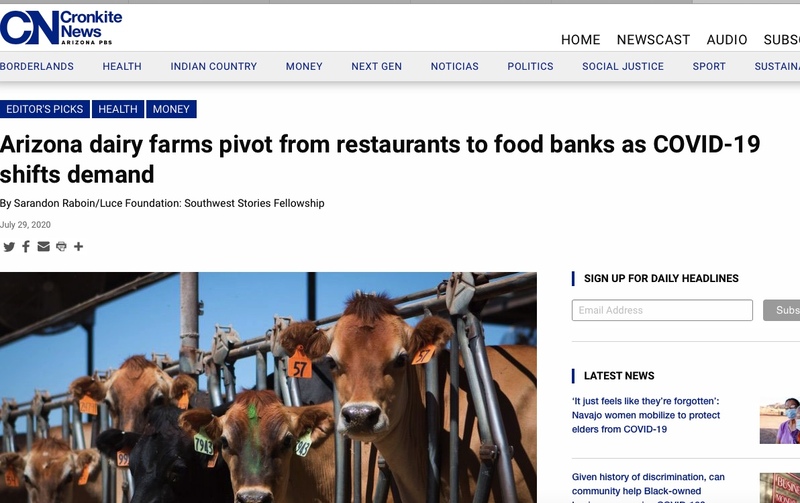
2020-07-29
By Sarandon Raboin/Luce Foundation: Southwest Stories Fellowship
 2022-02-08
2022-02-08 2021-09-22
2021-09-22 2021-09-03
2021-09-03 2021-08-21
2021-08-21 2020-04-30
2020-04-30 2021-04-03
2021-04-03 2021-04-11
2021-04-11 2021-04-03
2021-04-03 2021
2021 2021-03-20
2021-03-20 2021-03-16
2021-03-16 2021-03-06
2021-03-06 2021-03-06
2021-03-06 2021-03-04
2021-03-04 2021-03-04
2021-03-04 2021-03-02
2021-03-02 2020-03-01
2020-03-01 2020-02-27
2020-02-27 2021-02-16
2021-02-16 2021-02-22
2021-02-22 2021-02-20
2021-02-20 02/21/2021
02/21/2021 2021-02-21T14:40
2021-02-21T14:40 02/21/2021
02/21/2021 02/18/2021
02/18/2021 02/16/2021
02/16/2021 2021-02-20
2021-02-20 2021-02-19
2021-02-19 2021-02-07T18:36
2021-02-07T18:36 2021-02-03
2021-02-03 2021-01-31
2021-01-31 2021-02-28T10:55
2021-02-28T10:55 2021-01-24
2021-01-24 2021-01-24
2021-01-24 11/28/2020
11/28/2020 2020-11-22
2020-11-22 10/21/2020
10/21/2020 2020-10-21
2020-10-21 10/10/2020
10/10/2020 2020-07-17
2020-07-17 2020-09-14
2020-09-14 2020-09-15
2020-09-15 2020-09-16
2020-09-16 2020-09-14
2020-09-14 2020-09-08
2020-09-08 2020-09-08
2020-09-08 2020-08-26
2020-08-26 2020-07-29
2020-07-29